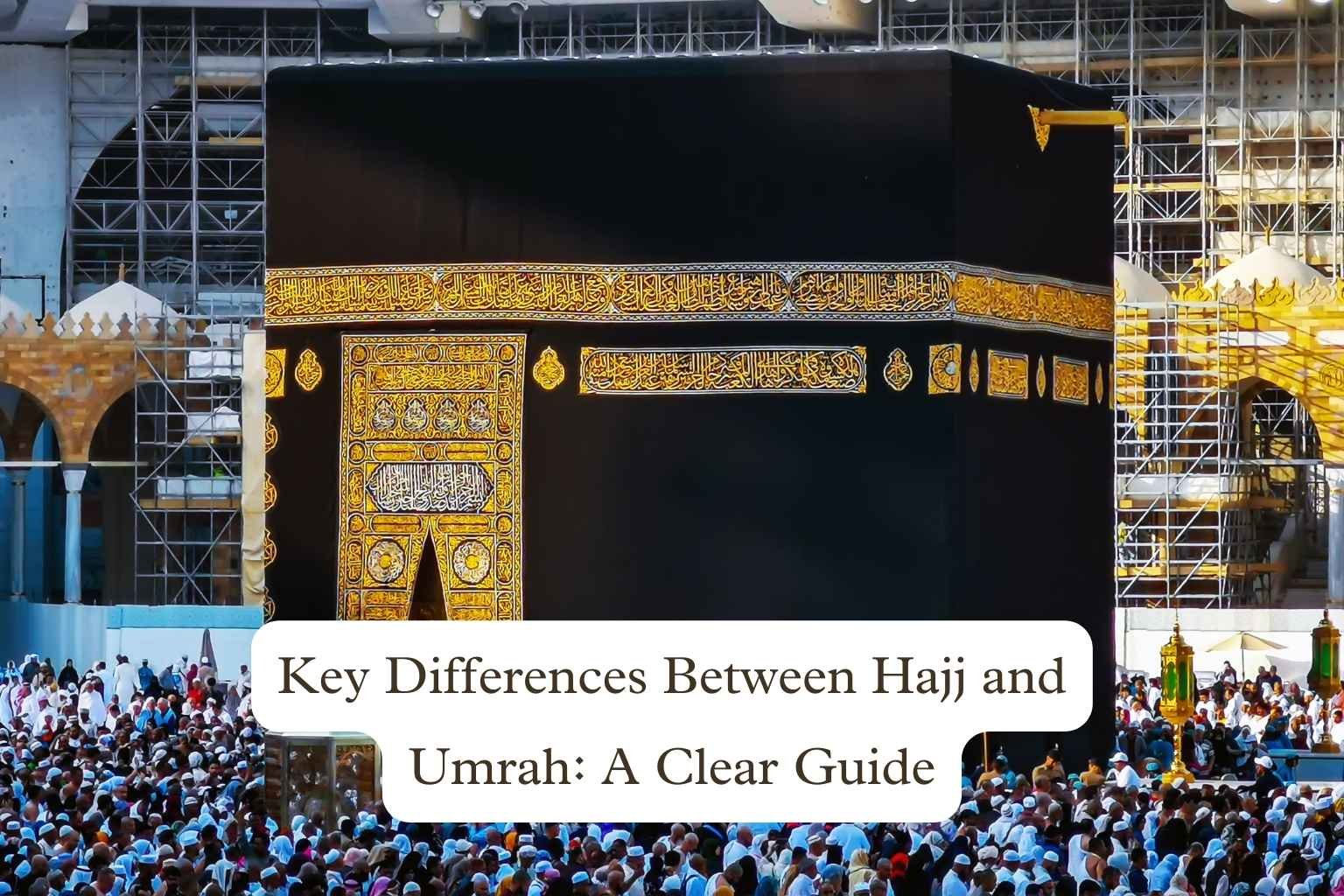
Key Differences Between Hajj and Umrah: A Clear Guide
When I was younger, I assumed Hajj and Umrah were basically the same—two pilgrimages to Makkah that look similar on the surface. After all, both involve ihram, tawaf around the Ka‘bah, and Sa’i between Safa and Marwa. Right? But later, after diving into Qur’an, learning from scholars, and listening to people who performed both, I realized just how different they truly are.
Hajj is one of Islam’s five pillars. It’s obligatory for every financially and physically able Muslim at least once in their lifetime. The Qur’an clearly emphasizes this: “For Allah, to humanity, pilgrimage to the House—if they are able to reach it—is a duty.” (Qur’an 3:97).
In contrast, Umrah—known as the “lesser pilgrimage”—is voluntary, but deeply meaningful. The Prophet ﷺ said: “Umrah to the next Umrah wipes out what came between them…”, highlighting its beautiful spiritual benefits.
Difference Between Hajj and Umrah
Many Muslims often wonder about the difference between Hajj and Umrah since both involve traveling to Makkah and performing similar rituals like Tawaf and Sa’i. While both are acts of worship that bring immense blessings, they differ in obligation, timing, rituals, duration, and spiritual impact. Below is a clear breakdown of these differences:
Obligation in Hajj vs Umrah
Hajj (Major Pilgrimage): Hajj is one of the five pillars of Islam. It is obligatory once in a lifetime for every Muslim who is physically, mentally, and financially able to perform it.
Umrah (Minor Pilgrimage): Umrah is not obligatory but is highly recommended. It is considered a Sunnah act that brings great spiritual reward.
Timing of Hajj and Umrah
Hajj: Can only be performed during the fixed Islamic dates of 8th to 12th Dhul-Hijjah each year.
Umrah: Can be performed at any time of the year. Performing Umrah in Ramadan is especially virtuous and considered equivalent to performing Hajj in reward (though it does not replace the obligation of Hajj).
Rituals of Hajj vs Umrah
Hajj: Involves several key rituals—entering Ihram, Tawaf, Sa’i, standing at Arafat, Muzdalifah, stoning the Jamarat, offering a sacrifice, and the farewell Tawaf.
Umrah: Simpler rituals—Ihram, Tawaf, Sa’i, and then shaving or trimming the hair.
Duration of Hajj and Umrah
Hajj: Takes several days, usually 5–6.
Umrah: Can be completed in just a few hours.
Spiritual Impact of Hajj vs Umrah
Hajj: Wipes away all previous sins, offering complete purification.
Umrah: Serves as ongoing forgiveness, expiating sins between two Umrahs
By understanding the difference between Hajj and Umrah, Muslims can appreciate the unique role each plays in spiritual growth. Hajj fulfills a core obligation of Islam, while Umrah provides flexibility for year-round worship and ongoing purification of sins. Both are incredible journeys that bring a believer closer to Allah.
Why This Distinction Matters
Understanding the difference between Hajj and Umrah shapes how we approach our worship. Some people think performing Umrah replaces Hajj—that’s not correct. Hajj remains an untransferable obligation. On the other hand, dismissing Umrah as a “bonus” trip misses out on its powerful spiritual rewards, including its cleansing effect.
So whether you’re planning for Hajj or considering performing Umrah, recognize what each journey asks of you—and what it gives you in return.
FAQs About the Difference Between Hajj and Umrah
1. What is the main difference between Hajj and Umrah?
Hajj is a mandatory pilgrimage for Muslims who are physically and financially able, performed only once a year during Dhul Hijjah. Umrah, on the other hand, is a voluntary act of worship that can be performed at any time of the year.
2. Is Hajj compulsory for every Muslim?
Yes, Hajj is one of the five pillars of Islam and is compulsory once in a lifetime for Muslims who meet the conditions of financial ability, physical health, and safety of travel.
3. Can Umrah replace Hajj?
No, Umrah cannot replace Hajj. While Umrah is a highly rewarding act of worship, it is considered a Sunnah. Hajj remains a mandatory duty that must be fulfilled when possible.
4. How long does it take to perform Umrah compared to Hajj?
Umrah can be completed in just a few hours, whereas Hajj takes several days, specifically from the 8th to the 13th of Dhul Hijjah, with specific rituals performed on each day.
5. Which is more rewarding, Hajj or Umrah?
Both carry immense rewards, but Hajj holds greater significance as it is a pillar of Islam. However, performing Umrah regularly brings blessings, forgiveness of sins, and closeness to Allah.